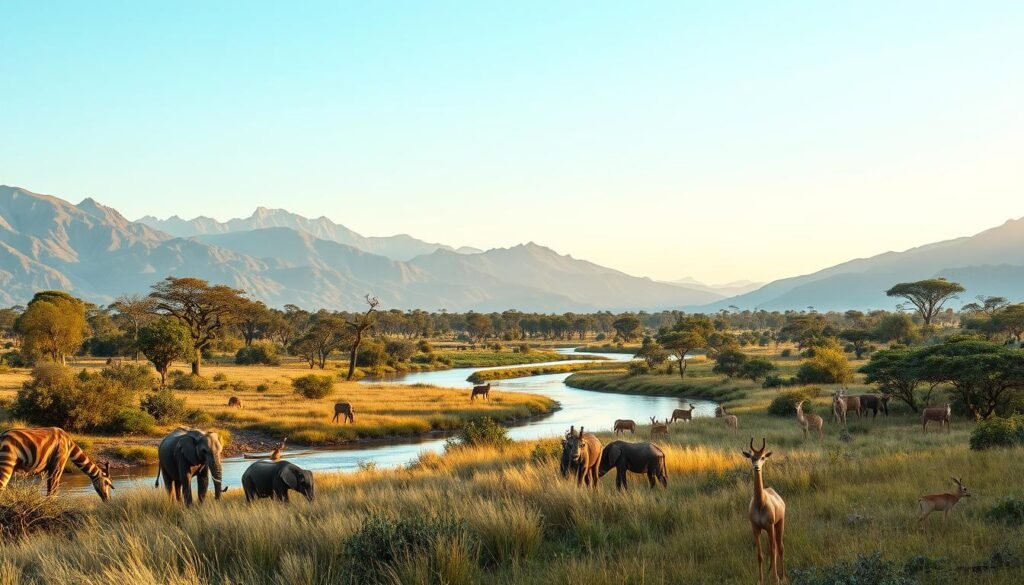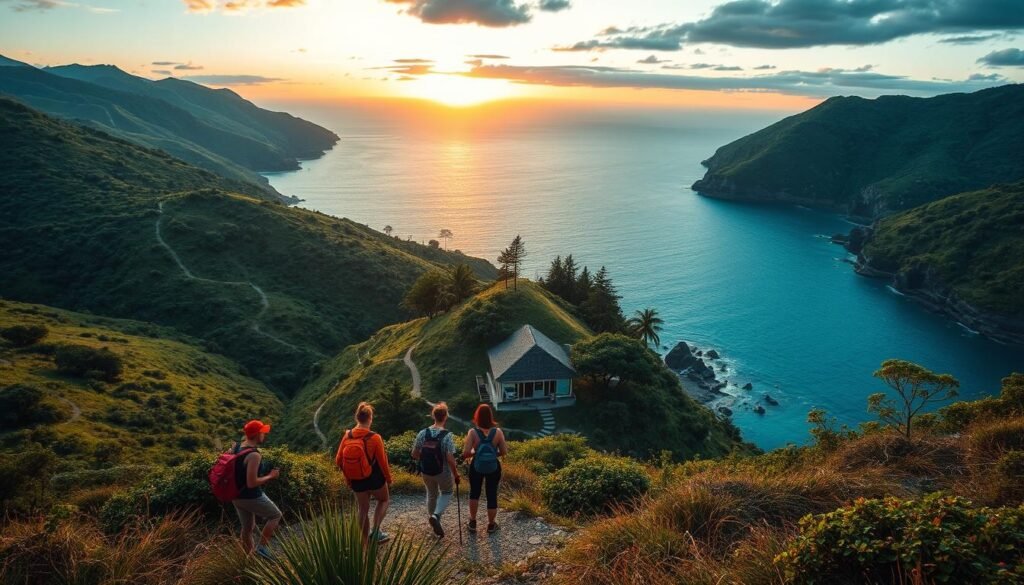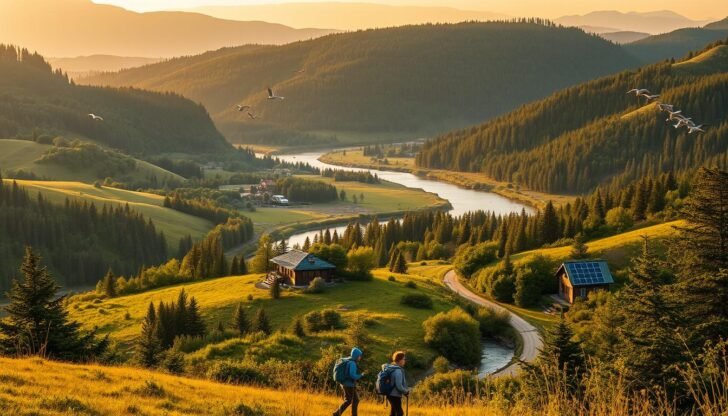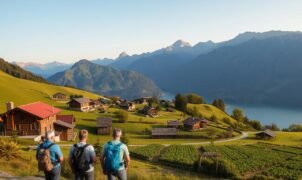Importance Of Ecotourism
As we travel, we’re learning more about our impact on Earth. Traditional tourism harms the environment, adding to greenhouse gas emissions. By 2018, tourism was responsible for about 8% of global greenhouse gas emissions.
Ecotourism is a greener choice. It supports local communities and protects the environment. By picking eco-friendly tourism, we can lower our carbon footprint and see the world in new ways.
This move towards sustainable travel is good for the planet and for us. It lets us explore responsibly and leave a positive mark on the places we visit.
Key Takeaways
- Reduce your carbon footprint with eco-friendly tourism
- Support local communities through sustainable travel practices
- Experience authentic destinations with a focus on environmental conservation
- Ecotourism promotes cultural exchange and understanding
- Make a positive impact on the environment and local economies
What is Ecotourism?
Ecotourism is growing as people become more aware of environmental issues. It promotes eco-friendly tourism and helps local communities. It’s not just a trend; it’s a movement towards responsible tourism.
Definition of Ecotourism
Ecotourism focuses on visiting exotic, often threatened, natural areas. It aims to support conservation and observe wildlife. It’s about traveling to natural spots that protect the environment and support local people.
The International Ecotourism Society defines it as “responsible travel to natural areas. It conserves the environment, supports local people, and involves learning and education.”
Key Principles of Ecotourism
Ecotourism’s core principles include minimizing environmental impact, supporting local communities, and promoting conservation. Key principles are:
- Minimizing social, behavioral, and psychological impact.
- Focusing on environmental and cultural awareness.
- Contributing to conservation efforts.
- Supporting local economies.
| Principle | Description | Example |
|---|---|---|
| Minimize Impact | Reduce waste and pollution. | Using biodegradable materials. |
| Support Local Communities | Engage with and support local economies. | Staying in locally owned accommodations. |
| Promote Conservation | Contribute to the preservation of natural habitats. | Participating in reforestation programs. |
By following these principles, ecotourism can be a strong force for environmental conservation. It encourages a culture of responsibility among travelers and local communities.
The Importance of Ecotourism
Ecotourism is key because it protects the environment and boosts local economies. It helps keep natural areas safe and gives jobs to local people. This way, it supports both nature and the community.
Environmental Protection
Ecotourism is a big help in saving our planet. For instance, Rwanda’s Volcanoes National Park made $16.4 million in 2016 from entrance fees. This money goes to protect endangered animals and keep the park beautiful.
Biodiversity Conservation Efforts through ecotourism include fixing habitats, watching wildlife, and using green tourism. These actions protect our world and make visits better for everyone.
Community Support
Ecotourism also helps local communities by giving them jobs and boosting their economy. It supports local businesses and helps people learn about different cultures. This support is key for tourism to last a long time.
Ecotourism helps local communities in many ways, like:
- Creating jobs in tourism
- Showing off local crafts and goods
- Helping with conservation projects led by the community
Sustainable Practices
Sustainable practices are at the heart of ecotourism. This means less waste, using green energy, and choosing eco-friendly places to stay. By doing this, ecotourism operators can lessen their harm to the environment and help the tourism industry stay green.
| Sustainable Practice | Benefit | Example |
|---|---|---|
| Reducing Waste | Minimizes environmental impact | Implementing recycling programs |
| Renewable Energy | Decreases reliance on fossil fuels | Using solar or wind power |
| Eco-friendly Accommodations | Enhances tourist experience | Building lodges with sustainable materials |
Economic Benefits of Ecotourism
Ecotourism is great for the economy, helping rural and indigenous areas. It supports local businesses and promotes green practices. This boosts the economic health of these communities.
Job Creation in Local Communities
Ecotourism fights poverty and empowers local communities by creating jobs. These jobs are in guiding, hospitality, and conservation. This income helps keep their culture alive.
Key areas where jobs are created include:
- Guiding and tour operations
- Hospitality and accommodation services
- Conservation and wildlife management
Boosting Local Economies
Ecotourism boosts local economies by encouraging the use of local goods and services. This money helps grow and develop these areas. They might not get attention from regular tourism.
The benefits include:
- Increased demand for local products
- Investment in local infrastructure
- Promotion of local culture and traditions
Supporting Sustainable Businesses
Ecotourism promotes sustainable businesses that care for the environment. This helps keep nature safe and makes tourism better.
Sustainable businesses benefit from:
- Reduced operational costs through energy-efficient practices
- Increased appeal to environmentally conscious tourists
- Support from local and international organizations promoting sustainable tourism
Ecotourism and Wildlife Conservation
Ecotourism is key in wildlife conservation. It brings in money that helps protect endangered animals and their homes. This tourism also teaches people about the need to save our environment.
Money from ecotourism helps local communities. They use it to keep their natural resources safe. In Tambopata, for example, lodge owners are saving more forest. This stops the forests from being cut down.

Protecting Endangered Species
Ecotourism helps protect endangered species. It gives local communities a reason to keep their wildlife safe. This way, they make money from wildlife, not harm it.
Ecotourism boosts conservation in national parks. Visitors help the local economy. This money goes to protect endangered animals.
Preserving Natural Habitats
Keeping natural habitats safe is a big part of ecotourism. It helps keep ecosystems balanced. This ensures habitats stay safe for many species.
Ecotourism operators work with local groups and conservationists. They make sure tourism doesn’t hurt the environment. This teamwork helps keep habitats safe for the future.
Authentic Cultural Experiences
Ecotourism lets travelers see local cultures in their true form. It connects them with local communities. This way, they learn about the area’s heritage and traditions.
Ecotourism focuses on community empowerment and cultural preservation. It helps local economies grow. It also keeps cultural practices alive for the future.
Engaging with Local Cultures
Meeting local cultures is key in ecotourism. Travelers can join in on many cultural activities. For example:
- Traditional cooking classes
- Local craft workshops
- Cultural festivals and events
These activities help travelers and locals connect. They build respect and understanding between them.
Learning through Interaction
Learning by doing is at the heart of ecotourism. Travelers can live with local families or join community tours. This way, they see how locals live and what they value.
This hands-on learning makes the trip better. It also helps keep cultural heritage alive. It’s a way of responsible tourism that helps everyone.
Travelers can learn in many ways. Here are a few:
- Homestay programs that let you live with families
- Community-led tours that share local customs
- Workshops and classes on local crafts
By taking these chances, travelers help preserve culture. They also help people from different backgrounds understand each other better.
How to Choose an Ecotourism Destination
More people are interested in eco-friendly tourism. It’s important to pick a destination that supports sustainable travel. When choosing, consider several key factors to make sure your trip is fun and responsible.
Researching Responsible Operators
Start by researching the tour operators. Look for those with certifications like Tourism Australia’s ECO Certification or the International Ecotourism Society. These show the operator follows strict environmental and social rules.
- Read reviews and testimonials to see what others think of the operator.
- Make sure the operator shares their environmental policies and practices clearly.
- Choose operators that help with local conservation or community projects.

Assessing Ecosystems and Biodiversity
It’s key to check the ecosystems and biodiversity of a destination. Places with rich wildlife and unique areas offer great ecotourism experiences. Here’s what to consider:
- Learn about the local wildlife and ecosystems to understand their conservation status.
- Find destinations that work on conservation or have protected areas.
- See how tourism affects the environment and if the destination has ways to lessen harm.
By researching operators and checking ecosystems, travelers can choose wisely. This supports sustainable travel and environmental conservation.
Responsible Travel Tips
Traveling responsibly means making choices that protect the environment and support local communities. Our travel habits can greatly affect the places and people we meet.
Minimizing Environmental Impact
Reducing our environmental footprint is key to responsible travel. Simple habits can make a big difference:
- Reduce waste by using reusable bags and water bottles instead of single-use plastics.
- Save water and energy by taking shorter showers and turning off lights and AC when not needed.
- Choose eco-friendly tour operators and places to stay that follow sustainable practices.
These small actions can greatly reduce our environmental impact. They help preserve natural resources for future generations.
Respecting Local Cultures and Customs
Respecting local cultures and customs is vital in responsible travel. This means:
- Learning about local customs to avoid unintentionally offending people.
- Engaging with local communities in a respectful way, like through community-based tourism.
- Supporting local businesses by buying local products and services.
By doing this, we empower local communities and foster cultural exchange.
In summary, responsible travel is about being aware of our actions and their effects. By following these tips, we help make tourism more sustainable and fair for everyone.
Popular Ecotourism Destinations in the U.S.
The U.S. has many national parks and protected areas perfect for eco-friendly travel. These places are not just beautiful but also let you practice sustainable tourism.
National Parks and Protected Areas
National parks in the U.S. are famous for their stunning landscapes and diverse wildlife. You can enjoy activities like hiking, birdwatching, and helping with wildlife conservation.
Yellowstone National Park is America’s first national park. It’s known for its geysers and wildlife like grizzly bears and wolves. You can join guided tours that teach about conservation and the park’s ecosystems.
“Yellowstone is a place where you can experience the raw power and beauty of nature, from its geysers to its abundant wildlife.”
Grand Canyon National Park is another must-see spot. It offers amazing views and outdoor activities. The park works on protecting its habitats and reducing tourism’s environmental impact.
Eco-friendly Resorts
Eco-friendly resorts are also popular in the U.S. These resorts aim to reduce their environmental impact while providing luxury and comfort.
- Post Ranch Inn in Big Sur, California, uses solar power and local materials for its sustainable practices.
- The Brant Point Inn on Nantucket, Massachusetts, focuses on reducing waste and conserving water.
These resorts offer a luxurious stay and help protect their environments.
| Destination | Ecotourism Activities | Conservation Efforts |
|---|---|---|
| Yellowstone National Park | Wildlife watching, hiking | Habitat protection, wildlife conservation |
| Grand Canyon National Park | Hiking, camping, scenic viewing | Reducing carbon footprint, habitat restoration |
| Post Ranch Inn, Big Sur | Nature walks, yoga, stargazing | Solar power usage, locally sourced materials |
Ecotourism in the U.S. is growing, with more people looking for sustainable travel options. By visiting eco-friendly resorts and national parks, you can enjoy the U.S.’s beauty while supporting conservation.
Challenges Facing Ecotourism
Ecotourism has many benefits but also faces big challenges. As it grows, it hits obstacles that can harm its goal of protecting environmental conservation and biodiversity conservation.
More people visiting places for ecotourism worries about its effects on nature and local life. The main issues are too many tourists and climate change.
Overtourism Concerns
Overtourism happens when too many tourists go to a place, stressing local resources and nature. This can cause environmental degradation, like pollution and loss of wildlife.
The problems of too many tourists include:
- More demand for water and energy
- Damage to natural habitats
- Upsetting local communities and cultures
To solve these issues, ecotourism operators and places are using green practices. They also try to control how many tourists come.
| Impact of Overtourism | Mitigation Strategies |
|---|---|
| Environmental Degradation | Sustainable waste management, eco-friendly accommodations |
| Habitat Destruction | Protected areas, guided tours to minimize footprint |
| Cultural Disruption | Community-led tours, cultural sensitivity training for tourists |
Climate Change Impacts
Climate change is a big threat to ecotourism. It changes ecosystems and harms the places ecotourism depends on. Rising temperatures and weather changes can destroy natural habitats and wildlife.
Climate change affects ecotourism in many ways, including:
- Rising sea levels and more flooding
- Changes in where species live and risk of extinction
- Effects on local economies and people
To tackle these issues, the ecotourism world is focusing on sustainable travel and supporting conservation.
The Future of Ecotourism
Ecotourism is on the verge of a big change. This is thanks to green travel trends and new tech. More people now want to travel in a way that’s good for the planet.
The importance of ecotourism is huge. It helps protect nature and helps local communities grow. By picking eco-friendly tours, we help keep our planet beautiful and support local people.
Trends in Eco-friendly Travel
Traveling green is becoming more popular. People now want to travel in a way that’s kind to the earth. This means choosing tours that don’t harm the environment.
- Reducing plastic use and waste
- Supporting local economies through sustainable tourism practices
- Promoting conservation efforts through wildlife tourism
These changes are good for our planet. They also help local people by giving them jobs and supporting their communities.
The Role of Technology in Ecotourism
Technology is changing ecotourism a lot. It makes traveling more fun and helps protect our planet. From online tours to green hotels, tech is making a difference.
For example, online platforms help connect travelers with green tour operators. This supports responsible tourism. Tech also helps track how tourism affects nature, making sure it’s done right.
As ecotourism grows, we need to find a balance. We must think about what travelers, local people, and nature need. By following green trends and using tech, we can make tourism better for everyone.
Conclusion: Why Choose Ecotourism?
Ecotourism lets travelers help protect the environment while seeing amazing places. It supports local communities and helps grow in a green way.
Key Advantages
Ecotourism has many good points. It helps keep nature safe, boosts local jobs, and brings people together. We can all help the planet and the places we visit.
Embracing Responsible Travel
To start traveling responsibly, look for eco-friendly tours and places. Making smart choices helps the whole travel industry become greener.

















[…] June 24, 2025Discover the Benefits of Ecotourism for Your Next TripExplore the benefits of ecotouri… […]